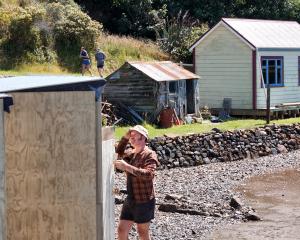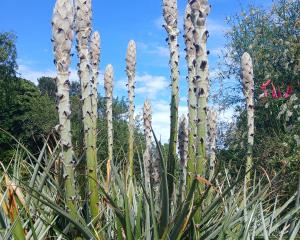Trees, shrubs and seeds are the focus in winter, Gillian Vine says.
Winter is the season for planting fruit and ornamental trees, plus many shrubs, including roses. It's the time, too, for selecting seeds to sow in spring.
Most deciduous fruit and nut trees are grown in paddocks, then lifted when dormant and transported to garden centres. This way, there is less stress on the plant so it has a better chance of getting off to a smooth start, hence winter planting.
With fruit and nut trees, we are fortunate having so many that grow well in Otago and Southland. Century-old walnuts, apples and pears can still be found in the South, while many gardens have plums, apricots, cherries and peaches dating back decades.
Deciduous trees, shrubs and roses are often sold bare-rooted, with damp sawdust or shredded newspaper around their roots to stop them drying out. Getting them planted at home does depend on the state of the ground, as nothing - including the gardener - does very well when the soil is frozen or covered with snow.
If you buy trees and shrubs but can't get them in straight away, heel them into a corner of the vegetable garden, put them into a container of potting mix or keep them moist in a bucket of water.
As soon as possible, dig a big hole, ideally twice as wide as the root span of the plant. A common mistake is to make it too deep: being able to spread the roots like a starfish is more beneficial than expecting them to push down looking for food.
In heavy ground, loosen the sides and base of the hole with a strong fork. Where clay is visible at the bottom, sprinkle one or two handfuls of gypsum to help break it down.
Gypsum (hydrated calcium sulphate) slowly releases calcium and sulphur into the ground, much to the delight of the tree, as calcium helps produce stronger plants and sulphur promotes root growth.
Being pH neutral, gypsum can be used on all soils. Put in a layer of compost so the tree roots do not come in contact with the gypsum.
If growing trees or tall shrubs, put a stake in the hole before planting, carefully position the plant, then fill the hole and press the soil down so it is firm but not compacted. Tie the tree to the stake with soft material (old pantihose are ideal) and water lightly.
Buying early before popular varieties sell out is recommended, and the same goes for seed, especially of vegetables.
Egmont Seeds, of New Plymouth, packs for several brands and general manager John McCullough says: ''Vegetable seed packets have outsold flower seed in all the brands we pack for many years. That includes our Egmont Seeds mail orders.''
In contrast, The Guardian newspaper reported recently that sales of vegetable seeds in Britain were exceeding those of flowers for the first time since World War 2. Vegetables now account for almost 80% of sales of seeds and plants in the United Kingdom, compared with 30% in the 1990s.
Unlike Britain, Mr McCullough notes ''a small-trend increase in flower versus vegetable ratio over the last few years [but] I can't see that it will ever get close to vegetables''.
He says most seed in New Zealand is sold by big chain stores - The Warehouse, Mitre 10 and Bunnings - which work on an 80:20 vegetable to flower ratio.
Reflecting the high interest in growing from seed, Australian company Mr Fothergill's has launched two of its ranges, Mr Fothergill's and World Kitchen, in New Zealand.
Available from Bunnings and some independent garden retailers, Mr Fothergill's offers seed from classics to slightly less usual varieties and the range is probably the widest in New Zealand.
Several specialist sub-ranges - Sprouts Alive sprouting seeds, microgreens, heirloom, Little Gardeners seeds for children and organic seeds - are included.
The World Kitchen seed range has 70 herbs and vegetables, including Thai eggplant Kermit, water spinach, winged asparagus pea, goji berry, cape gooseberry and choy sum. Each seed packet has recipe ideas, too.












